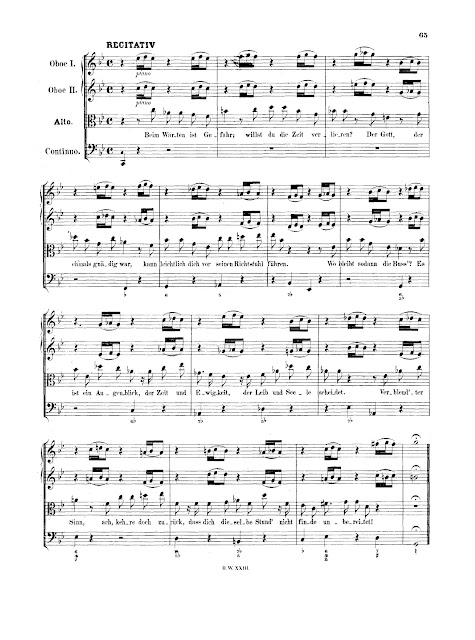DLXXX. BACH, J.S. (1685-1750)
Another two-part cantata, designed so that the sermon can be read at the halfway point. The subject is repentance.
Prima Parte
1. [Coro]: Herr, deine Augen sehen nach dem Glauben!
Bach is at the top of his game here. Notice how the oboes, violins and continuo complement each other so perfectly, and when the voices enter, they never merely double, but continue to build a rich accompaniment.
Based on Jeremiah 5:3.
2. Recitativo (Basso): Wo ist das Ebenbild
Of God Himself, which in our hearts He has implanted?
Where lies the power of His word
To move the sullen heart by no repentance stirred?
The Highest seeks by gentleness to breed contrition
That thus the erring soul be wakened to submission
But, if we will not heed, or do our part
He leaves us stewing with our stubborn heart
3. Aria (Alto): Weh der Seele
Just oboe and continuo accompany the Alto:
Know no shame
Heedless all to doom are rushing
Blind to blame
Yes, the Grace of God itself
Do they disclaim
4. Arioso (Basso): Verachtest du den Reichtum seiner Gnade
Based on Romans 2:4-5. The bass is vox Christi.
Dost thou despise the riches of His goodness, patience and tolerant grace! Knowest thou not that the Grace of God doth inspire repentance? But after the hard and impertinent heart thou treasurest ever up to thyself His wrath for the Day of Wrath, and the revelation of the righteous decree of God?
Seconda Parte
5. [Aria] (Tenore): Erchrecke doch, du allzu sichre Seele!
This da capo aria features solo flute and continuo accompaniment:
Seconda Parte
5. [Aria] (Tenore): Erchrecke doch, du allzu sichre Seele!
This da capo aria features solo flute and continuo accompaniment:
Thou selfsufficient spirit!
Know that thou richly merit
The sinner's yoke
Tho' God's forbearance makes Him slow to wrath at Thee
Yet in the end His wrath will much the fiercer be
6. Recitativo (Alto): Beim Warten st Gefahr
Two oboes play the same two 16ths-1/8th rhythm on the second and fourth beats:
Why put off thy repentance?
Thy God, 'til now so kind to Thee
At any moment may pronounce thy sentence
How then of penitence?
An instant separates
Eternity from time, holds frame and soul together
Thou blinded one, ah, turn thou back again
That when thine hour come 'twill find thee not unready
7. Choral [Coro]: Heut lebst du, heut bekehre dich
Based on the hymn tune So wahr ich lebe, spricht dein Gott by Johann Heermann (1630), and sung to the melody of Martin Luther's Vater unser im Himmelreich, based on the Lord's Prayer.
Get you to God while still there's time
Today alert and sound and brave
Tomorrow sick or in your grave
By penitence God's wrath dispel
Or face the fiendish fires of Hell
Help, Thou Lord Jesus, help Thou me
That I today may come to Thee
Teach me, I pray Thee, penitence
Before swift death shall bear me hence
That ready I may ever be
To take my journey home to Thee














No comments:
Post a Comment